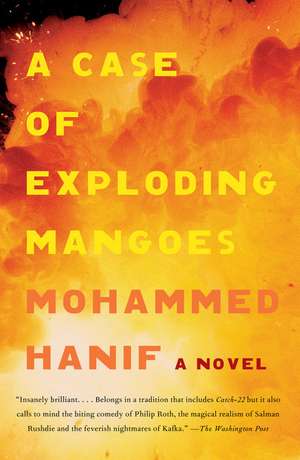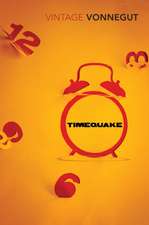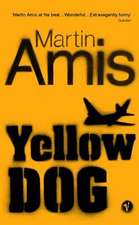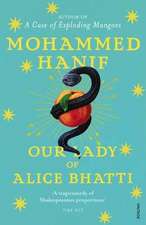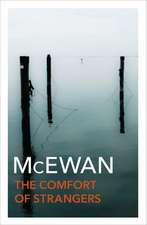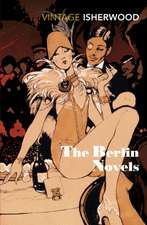A Case of Exploding Mangoes
Autor Mohammed Hanifen Limba Engleză Paperback – 30 apr 2009
Vezi toate premiile Carte premiată
Guardian First Book Award (2008)
Intrigue and subterfuge combine with bad luck and good in this darkly comic debut about love, betrayal, tyranny, family, and a conspiracy trying its damnedest to happen.
Ali Shigri, Pakistan Air Force pilot and Silent Drill Commander of the Fury Squadron, is on a mission to avenge his father's suspicious death, which the government calls a suicide.Ali's target is none other than General Zia ul-Haq, dictator of Pakistani. Enlisting a rag-tag group of conspirators, including his cologne-bathed roommate, a hash-smoking American lieutenant, and a mango-besotted crow, Ali sets his elaborate plan in motion. There's only one problem: the line of would-be Zia assassins is longer than he could have possibly known.
| Toate formatele și edițiile | Preț | Express |
|---|---|---|
| Paperback (2) | 53.28 lei 24-35 zile | +19.27 lei 4-10 zile |
| Random House – 4 iun 2009 | 53.28 lei 24-35 zile | +19.27 lei 4-10 zile |
| Vintage Books USA – 30 apr 2009 | 121.63 lei 3-5 săpt. |
Preț: 121.63 lei
Nou
Puncte Express: 182
Preț estimativ în valută:
23.28€ • 24.05$ • 19.37£
23.28€ • 24.05$ • 19.37£
Carte disponibilă
Livrare economică 04-18 martie
Preluare comenzi: 021 569.72.76
Specificații
ISBN-13: 9780307388186
ISBN-10: 0307388182
Pagini: 323
Dimensiuni: 130 x 198 x 20 mm
Greutate: 0.23 kg
Editura: Vintage Books USA
ISBN-10: 0307388182
Pagini: 323
Dimensiuni: 130 x 198 x 20 mm
Greutate: 0.23 kg
Editura: Vintage Books USA
Notă biografică
Mohammed Hanif runs the Urdu service of the BBC's World Service. He was in the Pakistani Air Force for seven years, and then a journalist in Pakistan, where he is also known as a playwright. He won the Board of Examiners top prize at the University of East Anglia this year for an excerpt from A Case of Exploding Mangoes, which is his first novel.
Extras
There is something about these bloody squadron leaders that makes them think that if they lock you up in a cell, put their stinking mouth to your ear, and shout something about your mother, they can find all the answers. They are generally a sad lot, these leaders without any squadrons to lead. It's their own lack of leadership qualities that stops them mid-career, nowhere for them to go except from one training institute to another, permanent seconds in command to one commander or the other. You can tell them from their belts, loose and low, straining under the weight of their paunches. Or from their berets, so carefully positioned to hide that shiny bald patch. Schemes for part-time M.B.A.'s and a new life are trying hard to keep pace with missed promotions and pension plans.
Look at the arrangement of fruit salad on my tormentor's chest, above the left pocket of his uniform shirt, and you can read his whole biography. A faded paratrooper's badge is the only thing that he had to leave his barracks to earn. The medals in the first row just came and pinned themselves to his chest. He got them because he was there. The Fortieth Independence Day medal. The Squadron Anniversary medal. Today-I-did-not-jerk-off medal. Then the second row, fruits of his own hard labour and leadership. One for organising a squash tournament, another for the great battle that was tree-plantation week. The leader with his mouth to my ear and my mother on his mind has had a freebie to Mecca and is wearing a haj medal, too.
As Obaid used to say, "God's glory. God's glory. For every monkey there is a houri."
The 2nd OIC is wasting more of his already-wasted life trying to break me down with his bad breath and his incessant shouting. Doesn't he know that I actually invented some of the bullshit that he is pouring into my ear? Hasn't he heard about the Shigri treatment? Doesn't he know that I used to get invited to other squadrons in the middle of the night to make the new arrivals cry with my three-minute routine about their mothers? Does he really think that "fuck your fucking mother," even when delivered at strength 5, still has any meaning when you are weeks away from the president's annual inspection and becoming a commissioned officer?
The theory used to be damn simple: Any good soldier learns to shut out the noise and delink such expressions from their apparent meaning. I mean, when they say that thing about your mother, they have absolutely no intention--and I am certain no desire, either--to do what they say they want to do with your mother. They say it because it comes out rapid-fire and sounds cool and requires absolutely no imagination. The last syllable of mother reverberates in your head for a while as it is delivered with their lips glued to your ear. And that is just about that. They have not even seen your poor mother.
Anybody who breaks down at the sheer volume of this should stay in his little village and tend his father's goats or should study biology and become a doctor, and then they can have all the bloody peace and quiet they want. Because as a soldier, noise is the first thing you learn to defend yourself against, and as an officer, noise is the first weapon of attack you learn to use.
Unless you are in the Silent Drill Squad.
Look at the parade square during the morning drill and see who commands it. Who rules? There are more than a thousand of us, picked from a population of 130 million, put through psychological and physical tests so strenuous that only one in a hundred applicants makes it, and when this cream of our nation, as we are constantly reminded we are, arrives here, who leads them? The one with the loudest voice, the one with the clearest throat, the one whose chest can expand to produce a command that stuns the morning crows and makes the most stubborn of cadets raise their knees to waist level and bring the world to a standstill as their heels land on the concrete.
Or at least that is what I believed before Lieutenant Bannon arrived with his theories about inner cadence, silent commands, and subsonic drill techniques. "A drill with commands is just that--a drill," Bannon is fond of saying. "A drill without commands is an art. When you deliver a command at the top of your voice, only the boys in your squadron listen. But when your inner cadence whispers, the gods take notice."
Not that Bannon believes in any god.
I wonder whether he'll visit me here. I wonder whether they will let him into this cell.
The 2nd OIC is exhausted from his business with my mother and I can see an appeal to my better sense on its way. I clench my stomach muscles against the impending "cream of the nation" speech. I don't want to throw up. The cell is small and I have no idea how long I am going to be here.
"You are the cream of our nation," he says, shaking his head. "You have been the pride of our Academy. I have just recommended you for the sword of honour. You are going to receive it from the president of Pakistan. You have two choices: graduate with honour in four weeks or go out front-rolling to the sound of drums. Tomorrow. Clap. Clap. Tony Singh-style." He brings his hands together twice, like those Indian film extras in a qawwali chorus.
They did that to Tony Singh. Drummed the poor bugger out. I never figured out what the hell Tony Singh was doing in the air force of the Islamic Republic anyway. Before meeting Tony Singh (or Sir Tony, as we had to call him, since he was six courses senior to us), the only Tony I knew was our neighbour's dog and the only Singh I had seen was in my history textbook, a one-eyed maharaja who ruled Punjab a couple of centuries ago. I thought the partition took care of all the Tonys and the Singhs, but apparently some didn't get the message.
Tony Singh didn't get the message even when they found a transistor radio in his dorm and charged him with spying. "Top of the Pops" was Sir Tony's defence. They reduced the charge to unofficerlike behaviour and drummed him out anyway.
A lone drummer--a corporal who, after carrying the biggest drum in the Academy band all his life, had begun to look like one--led the way, keeping a thud, thud, thud-a-dud marching beat. More than one thousand of us lined both sides of Eagles Avenue, which leads from the guardroom to the main gate.
"At ease," came the command.
Tony Singh emerged from the guardroom, having spent a couple of nights in this very cell. His head was shaved, but he still wore his uniform. He stood tall and refused to look down or sideways.
"Clap," came the command.
We started slowly. The 2nd OIC removed Sir Tony's belt and the ranks from his shoulder flaps and then he took a step forward and whispered something into Sir Tony's ear. Sir Tony went down on his knees, put both his hands on the road, and did a front roll without touching his shaved head on the ground.
The bugger was trying to be cocky even when his ass was raised to the skies.
His journey was painfully slow. The drumbeat became unbearable after a while. Some cadets clapped more enthusiastically than others.
I glanced sideways and saw Obaid trying hard to control his tears.
"Sir, I swear to God I have no knowledge of Cadet Obaid's whereabouts," I say, trying to tread the elusive line between grovelling and spitting in his face.
The 2nd OIC wants to get home. An evening of domestic cruelty and Dallas beckons him. He waves my statement in front of me. "You have one night to think this through. Tomorrow it goes to the commandant, and the only thing he hates more than his men disappearing is their clever-dick collaborators. He is looking forward to the president's visit. We are all looking forward to the visit. Don't fuck it up."
He turns to go. My upper body slumps. He puts one hand on the door handle and turns; my upper body comes back to attention. "I saw your father once, and he was a soldier's bloody soldier. Look at yourself." A leery grin appears on his lips. "You mountain boys get lucky because you have no hair on your face."
I salute him, using all my silent drill practice to contain the inner cadence, which is saying, Fuck your mother, too.
I wonder for a moment what Obaid would do in this cell. The first thing that would have bothered him is the smell the 2nd OIC has left behind. This burnt onions, homemade yogurt gone bad smell. The smell of suspicion, the smell of things not quite having gone according to plan. Because our Obaid, our Baby O, believes that there is nothing in the world that a splash of Poison on your wrist and an old melody can't take care of.
He is innocent in a way that lonesome canaries are innocent, flitting from one branch to another, the tender flutter of their wings and a few millilitres of blood keeping them airborne against the gravity of this world that wants to pull everyone down to its rotting surface.
What chance would Obaid have with this 2nd OIC? Baby O, the whisperer of ancient couplets, the singer of golden oldies. How did he make it through the selection process? How did he manage to pass the Officerlike Qualities Test? How did he lead his fellow candidates through the mock jungle-survival scenarios? How did he bluff his way through the psychological profiles?
All they needed to do was pull down his pants and see his silk briefs with the little embroidered hearts on the waistband.
Where are you, Baby O?
Lieutenant Bannon saw us for the first time at the annual variety show, doing our dove and hawk dance. This was before the commandant replaced these variety shows with Quran Study Circles and After-Dinner Literary Activities. As third-termers, we had to do all the shitty fancy-dress numbers, and seniors got to lip-synch to George Michael songs. We were miming to a very macho revolutionary poem. I, the imperialist eagle, swooped down on Obaid's Third World dove; he fought back, and for the finale sat on my chest, drawing blood from my neck with his cardboard beak.
Bannon came to meet us backstage as we were shedding our ridiculous feathers. "Hooah, you zoomies should be in Hollywood!" His handshake was exaggerated and firm. "Good show. Good show." He turned towards Obaid, who was cleaning the brown boot polish from his cheeks with a hankie. "You're just a kid without that war paint," Bannon said. "What's your name?"
In the background, Sir Tony's "Careless Whisper" was so out of tune that the speakers screeched in protest.
Under his crimson beret, Bannon's face was beaten leather, his eyes shallow green pools that had not seen a drop of rain in years.
"Obaid. Obaid-ul-llah."
"What does it mean?"
"Allah's servant," said Obaid, sounding unsure, as if he should explain that he hadn't chosen this name for himself.
I came to Obaid's rescue. "What does your name mean, Lieutenant Bannon?"
"It's just a name," he said. "Nobody calls me 'Lieutenant.' It's 'Loot' Bannon for you stage mamas." He clicked his heels together and turned back to Obaid. We both came to attention. He directed his over-the-top two-fingered salute at Obaid and said the words which in that moment seemed like just another case of weird U.S. militaryspeak but would later become the stuff of dining hall gossip.
"See you at the square, Baby O."
I felt jealous, not because of the intimacy it implied, but because I wished I had come up with this nickname for Obaid.
I make a mental note of the things they could find in the dorm to throw at me:
1.One-quarter of a quarter bottle of Murree rum.
2.A group photo of first-termers in their underwear (white and December-wet underwear actually).
3.A video of Love on a Horse.
4.Bannon's dog tags, still listed as missing on the guardroom's Lost and Found notice board.
If my Shigri blood wasn't so completely void of any literary malaise, I would have listed poetry as Exhibit 5, but who the fuck really thinks about poetry when locked up in a cell, unless you are a Communist or a poet?
There is a letter-box slit in the door of the cell, as if people are going to send me letters. Dear Ali Shigri, I hope you are in the best of health and enjoying your time in . . .
I am on my knees, my eyes level with the letter-box slit. I know Obaid would have lifted the flap on the slit and would have sat here looking at the parade of khaki-clad butts, and amused himself by guessing which one belonged to whom. Our Baby O could do a detailed personality analysis just by looking at where and how tightly people wore their belts.
I don't want to lift the flap and find someone looking at me looking at them. The word is probably already out. That butcher Shigri is where he deserves to be; throw away the key.
The flap lifts itself, and the first-termer shitface announces my dinner. "Buzz off," I say, regretting it immediately. Empty stomach means bad dreams.
In my dream, there is a C-130 Hercules, covered with bright flowers like you see on those hippie cars. The plane's propellers are pure white and move in slow motion, spouting jets of jasmine flowers. Baby O stands on the tip of the right wing, just behind the propeller, wearing a black silk robe and his ceremonial peaked cap. I stand on the tip of the left wing in full uniform. Baby O is shouting something above the din of the aircraft. I can't really make out any words, but his gestures tell me that he is asking me to come to him. As I take the first step towards Baby O, the C-130 tilts and goes into a thirty-degree left turn, and suddenly we are sliding along the wings, heading for oblivion. I wake up with one of those screams that echoes through your body but gets stuck in your throat.
From the Hardcover edition.
Look at the arrangement of fruit salad on my tormentor's chest, above the left pocket of his uniform shirt, and you can read his whole biography. A faded paratrooper's badge is the only thing that he had to leave his barracks to earn. The medals in the first row just came and pinned themselves to his chest. He got them because he was there. The Fortieth Independence Day medal. The Squadron Anniversary medal. Today-I-did-not-jerk-off medal. Then the second row, fruits of his own hard labour and leadership. One for organising a squash tournament, another for the great battle that was tree-plantation week. The leader with his mouth to my ear and my mother on his mind has had a freebie to Mecca and is wearing a haj medal, too.
As Obaid used to say, "God's glory. God's glory. For every monkey there is a houri."
The 2nd OIC is wasting more of his already-wasted life trying to break me down with his bad breath and his incessant shouting. Doesn't he know that I actually invented some of the bullshit that he is pouring into my ear? Hasn't he heard about the Shigri treatment? Doesn't he know that I used to get invited to other squadrons in the middle of the night to make the new arrivals cry with my three-minute routine about their mothers? Does he really think that "fuck your fucking mother," even when delivered at strength 5, still has any meaning when you are weeks away from the president's annual inspection and becoming a commissioned officer?
The theory used to be damn simple: Any good soldier learns to shut out the noise and delink such expressions from their apparent meaning. I mean, when they say that thing about your mother, they have absolutely no intention--and I am certain no desire, either--to do what they say they want to do with your mother. They say it because it comes out rapid-fire and sounds cool and requires absolutely no imagination. The last syllable of mother reverberates in your head for a while as it is delivered with their lips glued to your ear. And that is just about that. They have not even seen your poor mother.
Anybody who breaks down at the sheer volume of this should stay in his little village and tend his father's goats or should study biology and become a doctor, and then they can have all the bloody peace and quiet they want. Because as a soldier, noise is the first thing you learn to defend yourself against, and as an officer, noise is the first weapon of attack you learn to use.
Unless you are in the Silent Drill Squad.
Look at the parade square during the morning drill and see who commands it. Who rules? There are more than a thousand of us, picked from a population of 130 million, put through psychological and physical tests so strenuous that only one in a hundred applicants makes it, and when this cream of our nation, as we are constantly reminded we are, arrives here, who leads them? The one with the loudest voice, the one with the clearest throat, the one whose chest can expand to produce a command that stuns the morning crows and makes the most stubborn of cadets raise their knees to waist level and bring the world to a standstill as their heels land on the concrete.
Or at least that is what I believed before Lieutenant Bannon arrived with his theories about inner cadence, silent commands, and subsonic drill techniques. "A drill with commands is just that--a drill," Bannon is fond of saying. "A drill without commands is an art. When you deliver a command at the top of your voice, only the boys in your squadron listen. But when your inner cadence whispers, the gods take notice."
Not that Bannon believes in any god.
I wonder whether he'll visit me here. I wonder whether they will let him into this cell.
The 2nd OIC is exhausted from his business with my mother and I can see an appeal to my better sense on its way. I clench my stomach muscles against the impending "cream of the nation" speech. I don't want to throw up. The cell is small and I have no idea how long I am going to be here.
"You are the cream of our nation," he says, shaking his head. "You have been the pride of our Academy. I have just recommended you for the sword of honour. You are going to receive it from the president of Pakistan. You have two choices: graduate with honour in four weeks or go out front-rolling to the sound of drums. Tomorrow. Clap. Clap. Tony Singh-style." He brings his hands together twice, like those Indian film extras in a qawwali chorus.
They did that to Tony Singh. Drummed the poor bugger out. I never figured out what the hell Tony Singh was doing in the air force of the Islamic Republic anyway. Before meeting Tony Singh (or Sir Tony, as we had to call him, since he was six courses senior to us), the only Tony I knew was our neighbour's dog and the only Singh I had seen was in my history textbook, a one-eyed maharaja who ruled Punjab a couple of centuries ago. I thought the partition took care of all the Tonys and the Singhs, but apparently some didn't get the message.
Tony Singh didn't get the message even when they found a transistor radio in his dorm and charged him with spying. "Top of the Pops" was Sir Tony's defence. They reduced the charge to unofficerlike behaviour and drummed him out anyway.
A lone drummer--a corporal who, after carrying the biggest drum in the Academy band all his life, had begun to look like one--led the way, keeping a thud, thud, thud-a-dud marching beat. More than one thousand of us lined both sides of Eagles Avenue, which leads from the guardroom to the main gate.
"At ease," came the command.
Tony Singh emerged from the guardroom, having spent a couple of nights in this very cell. His head was shaved, but he still wore his uniform. He stood tall and refused to look down or sideways.
"Clap," came the command.
We started slowly. The 2nd OIC removed Sir Tony's belt and the ranks from his shoulder flaps and then he took a step forward and whispered something into Sir Tony's ear. Sir Tony went down on his knees, put both his hands on the road, and did a front roll without touching his shaved head on the ground.
The bugger was trying to be cocky even when his ass was raised to the skies.
His journey was painfully slow. The drumbeat became unbearable after a while. Some cadets clapped more enthusiastically than others.
I glanced sideways and saw Obaid trying hard to control his tears.
"Sir, I swear to God I have no knowledge of Cadet Obaid's whereabouts," I say, trying to tread the elusive line between grovelling and spitting in his face.
The 2nd OIC wants to get home. An evening of domestic cruelty and Dallas beckons him. He waves my statement in front of me. "You have one night to think this through. Tomorrow it goes to the commandant, and the only thing he hates more than his men disappearing is their clever-dick collaborators. He is looking forward to the president's visit. We are all looking forward to the visit. Don't fuck it up."
He turns to go. My upper body slumps. He puts one hand on the door handle and turns; my upper body comes back to attention. "I saw your father once, and he was a soldier's bloody soldier. Look at yourself." A leery grin appears on his lips. "You mountain boys get lucky because you have no hair on your face."
I salute him, using all my silent drill practice to contain the inner cadence, which is saying, Fuck your mother, too.
I wonder for a moment what Obaid would do in this cell. The first thing that would have bothered him is the smell the 2nd OIC has left behind. This burnt onions, homemade yogurt gone bad smell. The smell of suspicion, the smell of things not quite having gone according to plan. Because our Obaid, our Baby O, believes that there is nothing in the world that a splash of Poison on your wrist and an old melody can't take care of.
He is innocent in a way that lonesome canaries are innocent, flitting from one branch to another, the tender flutter of their wings and a few millilitres of blood keeping them airborne against the gravity of this world that wants to pull everyone down to its rotting surface.
What chance would Obaid have with this 2nd OIC? Baby O, the whisperer of ancient couplets, the singer of golden oldies. How did he make it through the selection process? How did he manage to pass the Officerlike Qualities Test? How did he lead his fellow candidates through the mock jungle-survival scenarios? How did he bluff his way through the psychological profiles?
All they needed to do was pull down his pants and see his silk briefs with the little embroidered hearts on the waistband.
Where are you, Baby O?
Lieutenant Bannon saw us for the first time at the annual variety show, doing our dove and hawk dance. This was before the commandant replaced these variety shows with Quran Study Circles and After-Dinner Literary Activities. As third-termers, we had to do all the shitty fancy-dress numbers, and seniors got to lip-synch to George Michael songs. We were miming to a very macho revolutionary poem. I, the imperialist eagle, swooped down on Obaid's Third World dove; he fought back, and for the finale sat on my chest, drawing blood from my neck with his cardboard beak.
Bannon came to meet us backstage as we were shedding our ridiculous feathers. "Hooah, you zoomies should be in Hollywood!" His handshake was exaggerated and firm. "Good show. Good show." He turned towards Obaid, who was cleaning the brown boot polish from his cheeks with a hankie. "You're just a kid without that war paint," Bannon said. "What's your name?"
In the background, Sir Tony's "Careless Whisper" was so out of tune that the speakers screeched in protest.
Under his crimson beret, Bannon's face was beaten leather, his eyes shallow green pools that had not seen a drop of rain in years.
"Obaid. Obaid-ul-llah."
"What does it mean?"
"Allah's servant," said Obaid, sounding unsure, as if he should explain that he hadn't chosen this name for himself.
I came to Obaid's rescue. "What does your name mean, Lieutenant Bannon?"
"It's just a name," he said. "Nobody calls me 'Lieutenant.' It's 'Loot' Bannon for you stage mamas." He clicked his heels together and turned back to Obaid. We both came to attention. He directed his over-the-top two-fingered salute at Obaid and said the words which in that moment seemed like just another case of weird U.S. militaryspeak but would later become the stuff of dining hall gossip.
"See you at the square, Baby O."
I felt jealous, not because of the intimacy it implied, but because I wished I had come up with this nickname for Obaid.
I make a mental note of the things they could find in the dorm to throw at me:
1.One-quarter of a quarter bottle of Murree rum.
2.A group photo of first-termers in their underwear (white and December-wet underwear actually).
3.A video of Love on a Horse.
4.Bannon's dog tags, still listed as missing on the guardroom's Lost and Found notice board.
If my Shigri blood wasn't so completely void of any literary malaise, I would have listed poetry as Exhibit 5, but who the fuck really thinks about poetry when locked up in a cell, unless you are a Communist or a poet?
There is a letter-box slit in the door of the cell, as if people are going to send me letters. Dear Ali Shigri, I hope you are in the best of health and enjoying your time in . . .
I am on my knees, my eyes level with the letter-box slit. I know Obaid would have lifted the flap on the slit and would have sat here looking at the parade of khaki-clad butts, and amused himself by guessing which one belonged to whom. Our Baby O could do a detailed personality analysis just by looking at where and how tightly people wore their belts.
I don't want to lift the flap and find someone looking at me looking at them. The word is probably already out. That butcher Shigri is where he deserves to be; throw away the key.
The flap lifts itself, and the first-termer shitface announces my dinner. "Buzz off," I say, regretting it immediately. Empty stomach means bad dreams.
In my dream, there is a C-130 Hercules, covered with bright flowers like you see on those hippie cars. The plane's propellers are pure white and move in slow motion, spouting jets of jasmine flowers. Baby O stands on the tip of the right wing, just behind the propeller, wearing a black silk robe and his ceremonial peaked cap. I stand on the tip of the left wing in full uniform. Baby O is shouting something above the din of the aircraft. I can't really make out any words, but his gestures tell me that he is asking me to come to him. As I take the first step towards Baby O, the C-130 tilts and goes into a thirty-degree left turn, and suddenly we are sliding along the wings, heading for oblivion. I wake up with one of those screams that echoes through your body but gets stuck in your throat.
From the Hardcover edition.
Recenzii
“An insanely brilliant, satirical first novel . . . Belongs in a tradition that includes Catch-22, but it also calls to mind the biting comedy of Philip Roth.”—The Washington Post"A brilliant debut. . . . Exceptional. . . . The detail is rich, the prose resonant. Grade A."—Rocky Mountain News“Like Catch-22, it is best understood as a satire of militarism, regulation and piety.... Hanif has written a historical novel with an eerie timeliness.”—The New York Times Book Review“Global satire with a savage bite. . . . Richly imagined.”—The Miami Herald“Hanif’s book is sexy, subversive, and magical.... Entertaining and original.” —Slate“Fascinating.... It sardonically examines the workings of the Pakistani state, which comes off like a Third World Brazil imagined by Raymond Chandler. What really drives Mangoes, however, is Hanif’s sharp writing and considerable wit.”—The Village Voice“There are many reasons to read this excellent novel, and one for which it should be celebrated: Hanif has found in Zia a veritable Homer Simpson of theocratic zealotry . . . The inevitable comparison here is to Dr. Strangelove, and just as the Kubrick film crystallized the absurdities of nuclear escalation into an archetypal cast of idiots-who-run-the-world, Mangoes provides the necessary update.”—New York Observer“Witty, elegant, and deliciously anarchic. Hanif has a lovely eye and an even better ear.”—John le Carré“Hanif confidently tackles ‘the biggest cover-up in aviation history since the last biggest cover-up,’ bringing absurdist humor and surprising warmth to his story.”—Entertainment Weekly“Funny, subversive, erotic, and sad. Anyone thinking of applying for the job of unhinged, religious dictator should read it first.” —Mark Haddon, author of The Curious Incident of the Dog in the Night-time“Unputdownable and darkly hilarious . . . Mohammed Hanif is a brave, gifted writer. He has taken territory in desperate need of satire–General Zia, the military, Pakistan at the time of the Soviet-Afghan war–and made it undeniably his own.”—Mohsin Hamid, author of The Reluctant Fundamentalist “A sure-footed, inventive debut that deftly undercuts its moral rage with comedy and deepens its comedy with moral rage . . . The novel has less in common with the sober literature of fact than it does with Latin American magical realism (especially novels about mythic dictators such as Gabriel García Márquez’s Autumn of the Patriarch) and absurdist military comedy (like Joseph Heller’s Catch-22). Hanif adopts a playful, exuberant voice, as competing theories and assassination plots are ingeniously combined and overlaid.”—Kirkus Reviews“Pakistan’s ongoing political turmoil adds a piquant edge to this fact-based farce . . . Hanif’s depiction of military foibles recalls the satirical wallop of Catch-22. [He brings] heft to this sagely absurd depiction of his homeland’s history of political conspiracies and corruption.”—Publishers Weekly “Entertaining and illuminating . . . Hanif has crafted a clever black comedy about military culture, love, tyranny, family, and the events that eventually brought us to September 11, 2001.”—Booklist
Descriere
Descriere de la o altă ediție sau format:
Why did a Hercules C130, the world's sturdiest plane, carrying Pakistan's military dictator General Zia ul Haq, go down on 17 August, 1988? Was it because of: mechanical failure, human error, the CIA's impatience, a blind woman's curse or Generals not happy with their pension plans. This novel takes one of the subcontinent's enduring mysteries.
Why did a Hercules C130, the world's sturdiest plane, carrying Pakistan's military dictator General Zia ul Haq, go down on 17 August, 1988? Was it because of: mechanical failure, human error, the CIA's impatience, a blind woman's curse or Generals not happy with their pension plans. This novel takes one of the subcontinent's enduring mysteries.
Premii
- Guardian First Book Award Nominee, 2008
